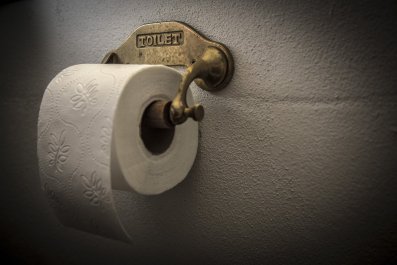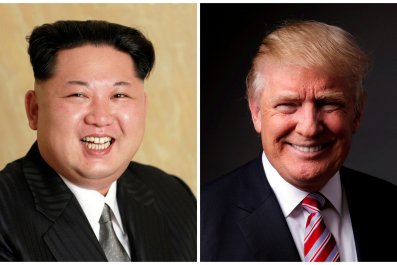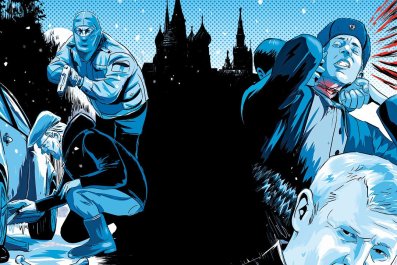After the American Psychiatric Association expanded its so-called Goldwater Rule into a gag order on mental health professionals, the forensic psychiatrist Dr. Bandy Lee organized a conference at Yale with the title, "Does Professional Responsibility Include a Duty to Warn?" to discuss the rule and its relevance during the increasingly alarming Trump presidency. While only two dozen attended physically in an atmosphere of fear, the conference tapped a huge groundswell of interest in the forms of hundreds of communications from mental health professionals: just as football players don't give up their right to free speech when they take the field, they agreed that the moral and civic duty to warn about the president's dangerousness should supersede professional rules about neutrality. This led to Dr. Lee editing a new book, The Dangerous Case of Donald Trump: 27 Psychiatrists and Mental Health Professionals Assess a President. Here are excerpts from four of the essays in the book.
A Persistent Loss of Reality
— Dr. Lance Dodes
Because Donald Trump has been a very public figure for many years, we are in an excellent position to know his behaviors—his speech and actions—which are precisely the basis for making an assessment of his dangerousness, whether we assess him using the American Psychiatric Association's Diagnostic and Statistical Manual of Mental Disorders criteria for antisocial personality disorder, as below, or whether we apply our knowledge of malignant narcissism, both of which include the signs and symptoms of sociopathy. Let us consider these in turn.
Lack of Empathy for Others; Lack of Remorse; Lying and Cheating
Trump's mocking the disability of a handicapped reporter, unconcern for the safety of protesters at a rally ("Get rid of them!"), sexually assaulting women, threatening physical harm to his opponent in the election (alluding to gun owners eliminating her), repeatedly verbally attacking a family who lost their son fighting for the country, degrading people who criticize him (calling them insulting names, as he did in both the Republican primaries and the general election), a history of cheating people he's hired by not paying them what he owes, and targeting and terrifying minority groups all provide overwhelming evidence of profound sociopathic traits.
Loss of Reality
Trump's insistence on the truth of matters proved to be untrue ("alternative facts") is well known, even when such denial is not in his interest. He has falsely claimed that President Barack Obama is not an American and that he wiretapped Trump's building, that his loss in the popular vote of the general election was caused by illegal aliens, that he had the largest inauguration crowd in history and so on. Together, these show a persistent loss of reality.
Rage Reactions and Impulsivity
Trump's rages have been reported on multiple occasions, leading to sudden decisions and actions. He fired and subsequently threatened the director of the FBI after hearing him testify in unwanted ways before Congress; launched more than 50 missiles within 72 hours of seeing a disturbing image on the news, reversing his stated Middle East policy; precipitously violated diplomatic norms, creating international tensions (as with reports of threatening to invade Mexico, hanging up on the prime minister of Australia, antagonizing Germany, France, Greece and others); and issued illegal executive orders, apparently without vetting them with knowledgeable attorneys.
Conclusion
While there have surely been American presidents who could be said to be narcissistic, none have shown sociopathic qualities to the degree seen in Trump. Correspondingly, none have been so definitively and so obviously dangerous. Democracy requires respect and protection for multiple points of view, concepts that are incompatible with sociopathy. The need to be seen as superior and a lack of empathy or remorse for harming other people are in fact the signature characteristics of tyrants, who seek the control and destruction of all who oppose them, as well as loyalty to themselves instead of the country they lead.
The paranoia of severe sociopathy creates a profound risk of war, since heads of other nations will inevitably disagree with or challenge the sociopathic leader, who will experience the disagreement as a personal attack, leading to rage reactions and impulsive action to destroy this "enemy." Trump's sociopathic characteristics are undeniable and create a profound danger for America.
Dr. Lance Dodes is a training and supervising analyst emeritus at the Boston Psychoanalytic Society.
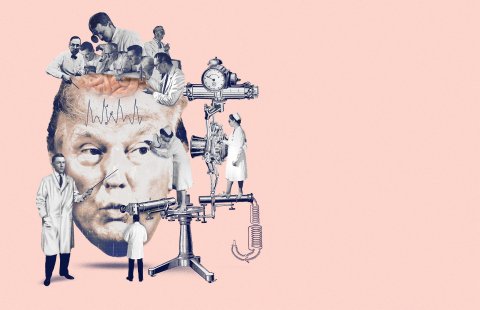
The Insurmountable Trust Deficit
—Gail Sheehy
The fundamental bedrock of human development is the formation of a capacity to trust, absorbed by children between birth and 18 months. Donald Trump has boasted of his total lack of trust: "People are too trusting. I'm a very untrusting guy." "Hire the best people and don't trust them." "The world is a vicious and brutal place. Even your friends are out to get you. They want your job, your money, your wife."
His biographers have recorded his worldview as saturated with a sense of danger and his need to project total toughness. As we know, his father trained him to be a "killer," the only alternative to being a "loser." Trump has never forgotten the primary lesson he learned from his father and at the military school to which he was sent to be toughened up further. In Trump's words, "Man is the most vicious of all animals, and life is a series of battles ending in victory or defeat."
As president, Trump is systematically shredding trust in the institutions he now commands. In the nearly two years that Trump has been in our face almost daily, he has sown mistrust in all his Republican rivals, alienated much of the conservative Republican bloc he needs in the House for legislative success, ignored congressional Democrats and viciously insulted Democratic leaders, calling them liars, clowns, stupid and incompetent, and condemning former President Barack Obama as "sick" and Hillary Clinton as "the devil." Having discredited the entire 17-agency intelligence community as acting like Nazis, he also dismissed the judiciary because of one judge's Hispanic background and another's opposition to his travel [née Muslim] ban. Even his Supreme Court justice, Neil Gorsuch, said it was "disheartening" and "demoralizing" to hear Trump disparage the judiciary. Not content to smear the media on a daily basis, Trump borrowed a phrase used by Lenin and Stalin to brand the American media as an "enemy of the people."
The nonmedical definition of paranoia is the tendency toward excessive or irrational suspiciousness and distrustfulness of others. By his own words, Trump operates on the assumption that everyone is out to get him.
We hear repeatedly that Trump as a manager likes chaos. I asked a deputy White House counsel under Obama, a decorated former officer in Iraq and former White House counsel to Obama, how such a management style impacts trust. "Trump explicitly or implicitly manages the situation so it's never possible for his advisers to know where they stand," he said. "It's the opposite of what you want in a high-functioning organization."
To the dismay of even conservative observers, Trump appears totally indifferent to the truth. Time gave Trump an opportunity to clarify his refusal to correct his long string of falsehoods. What the interview produced instead was an astonishing revelation of his thinking: He states what he wants to be true. If his statement is proved false, he is unfazed and confidently predicts that the facts will catch up with his belief: "I'm a very instinctual person, but my instinct turns out to be right."
Beneath the grandiose behavior of every narcissist lies the pit of fragile self-esteem. What if, deep down, the person whom Trump trusts least is himself? The humiliation of being widely exposed as a "loser," unable to bully through the actions he promised during the campaign, could drive him to prove he is, after all, a "killer."
Gail Sheehy is an author, journalist and popular lecturer.
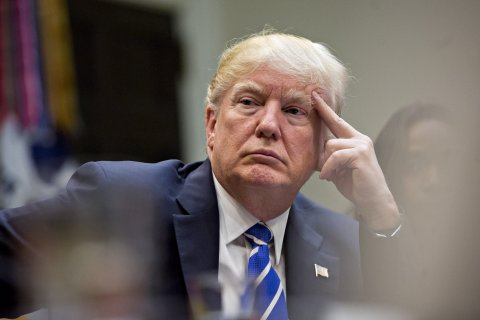
A Frightening Venn Diagram
— Philip Zimbardo
Through our observations, it was glaringly apparent that Donald Trump embodied a specific personality type: an unbridled, or extreme, present hedonist. As the words suggest, present hedonists live in the moment, without much thought of any consequences of their actions or of the future. An extreme present hedonist will say whatever it takes to pump up his ego and to assuage his inherent low self-esteem, without any thought for past reality or for the potentially devastating future outcomes. Our assertion that Trump is among the most extreme present hedonists we have ever witnessed comes from the plethora of written and recorded material on him.
The extreme present hedonist's impulsive thought leads to an impulsive action that can cause him to dig in his heels when confronted with the consequences of that action. If the person is in a position of power, then others scramble either to deny or to find ways to back up the original impulsive action. In normal day-to- day life, this impulsiveness leads to misunderstandings, lying and toxic relationships. In the case of Trump, an impulsive thought may unleash a stream of tweets or verbal remarks that then spur others to try to fulfill, or deny, his thoughtless action.
Case in point: Trump's impulsive tweet, "How low has President Obama gone to tapp [sic] my phones during the very sacred election process. This is Nixon/Watergate. Bad (or sick) guy!" caused members of his staff to scramble to find evidence to make the false and slanderous claim "real."
Another concerning characteristic of extreme present hedonists is the often unwitting—we like to give some extreme present hedonists the benefit of the doubt—propensity to dehumanize others in order to feel superior.
The Bullying Kind
In the early 1900s, Sigmund Freud introduced narcissism as part of his psychoanalytic theory. Throughout the ensuing decades, it was refined and sometimes referred to as megalomania or severe egocentrism. By 1968, the condition had evolved into the diagnosable narcissistic personality disorder. Narcissistic people are out of balance in that they think very highly of themselves while simultaneously thinking very lowly of all those whom they consider their inferiors, which is almost everybody. Narcissists are emotional, dramatic and can lack compassion and empathy.
What lies underneath this personality type is often very low self-esteem. Narcissists can't handle criticism of any kind, and will belittle others or become enraged or condescending to make themselves feel better when they perceive they are being criticized. It's not unusual for a narcissistic personality to be blind to his behavior because it doesn't fit his view of his perfect and dominant self.
Research indicates that some bullies may suffer from narcissistic personality disorder, while others may have difficulty interpreting or judging social situations and other people's actions—they interpret hostility from others when none was meant. For example, a person unintentionally bumps into a bully, who views this accident as an act of aggression; he therefore overreacts, which triggers the bully response of seeking revenge. Bullies have often been abused or are driven by their insecurities. They typically want to control and manipulate others to feel superior.
In Trump, we have a frightening Venn diagram consisting of three circles: The first is extreme present hedonism; the second, narcissism; and the third, bullying behavior. These three circles overlap in the middle to create an impulsive, immature, incompetent person who, when in the position of ultimate power, easily slides into the role of tyrant, complete with family members sitting at his proverbial "ruling table."
Everything Can Fall Apart
In presenting our case that Trump is mentally unfit to be president of the United States, we would be remiss if we did not consider one more factor: the possibility of a neurological disorder such as dementia or Alzheimer's disease, which the president's father, Fred Trump, suffered from. Again, we are not trying to speculate diagnoses from afar, but comparing video interviews of Trump from the 1980s, 1990s, and early 2000s to current video, we find that the differences (significant reduction in the use of essential words; an increase in the use of adjectives such as very, huge and tremendous; and incomplete, run-on sentences that don't make sense and that could indicate a loss of train of thought or memory) are conspicuously apparent.
Whether Trump suffers from a neurological disorder—or narcissistic personality disorder, or any other mental health issue, for that matter—will, undeniably, remain conjecture unless he submits to tests, which is highly unlikely given his personality. However, the lack of such tests cannot erase the well-documented behaviors he has displayed for decades and the dangers they pose. When an individual is psychologically unbalanced, everything can teeter and fall apart if change does not occur. We believe that Trump is the most dangerous man in the world, a powerful leader of a powerful nation who can order missiles fired at another nation because of his (or a family member's) personal distress at seeing sad scenes of people having been gassed to death.
We are gravely concerned about Trump's abrupt, capricious 180-degree shifts and how these displays of instability have the potential to be unconscionably dangerous. Corporations and companies vet their prospective employees. This vetting process frequently includes psychological testing in the form of exams or quizzes to help the employer make more informed hiring decisions and determine if the prospective employee is honest and/or would be a good fit for the company. These tests are used for positions ranging from department store sales clerk to high-level executive. Isn't it time that the same be required for candidates for the most important job in the world?
Philip Zimbardo, professor emeritus at Stanford University, is a scholar, educator and researcher perhaps best known for his landmark Stanford prison study.
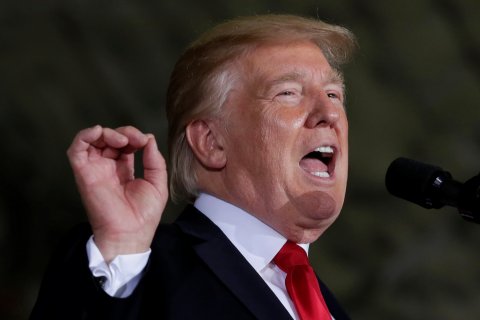
The Many Danger Signs
— Dr. James Gilligan
Psychiatrists in America today have been told that they have two diametrically opposite professional obligations, and that if they violate either one, they are behaving unethically. The first says they have an obligation to remain silent about their evaluation of anyone if that person has not given them permission to speak about it publicly. The second says they have an obligation to speak out and inform others if they believe that person may be dangerous to them, even if he has not given them permission to do so. From both an ethical and a legal standpoint, the second of those two trumps the first.
The issue here is not whether President Donald Trump is mentally ill. It is whether he is dangerous. Dangerousness is not a psychiatric diagnosis. One does not have to be "mentally ill" in order to be dangerous. Trump may or may not meet the criteria for any of the diagnoses of mental disorders defined in the Diagnostic and Statistical Manual of the American Psychiatric Association, or for many of them, but that is not relevant to the issue we are raising here.
The most reliable data for assessing dangerousness often do not require interviewing the individuals about whom we are forming an opinion. The most reliable data may come from the person's family and friends and, just as important, from police reports, criminal histories, and medical, prison and judicial records, as well as other publicly available information from third parties. In Trump's case, we also have many public records, tape recordings and videotapes, as well as his own public speeches, interviews and tweets of his numerous threats of violence, incitements to violence and boasts of violence that he himself acknowledges having committed repeatedly and habitually.
Sometimes, a person's dangerousness is so obvious that one does not need professional training in either psychiatry or criminology to recognize it. One does not need to have had 50 years of professional experience in assessing the dangerousness of violent criminals to recognize the dangerousness of a president who:
- Asks what the point of having thermonuclear weapons is if we cannot use them. For example, MSNBC host Joe Scarborough reported that Trump had asked a foreign policy adviser three times, "If we have them, why can't we use them?"
- Urges our government to use torture or worse against our prisoners of war. Throughout his presidential campaign, Trump repeatedly said "torture works," and promised to bring back "waterboarding" and to introduce new methods "that go a lot further."
- Urged that five innocent African-American youths be given the death penalty for a sexual assault years after it had been proved beyond a reasonable doubt to have been committed by someone else.
- Boasts about his ability to get away with sexually assaulting women because of his celebrity and power. Trump was recorded saying, of his way of relating to women, that "I just start kissing them. It's like a magnet…. I don't even wait. And when you're a star, they let you do it. You can do anything. Grab 'em by the pussy. You can do anything."
- Urges his followers at political rallies to punch protesters in the face and beat them up so badly that they have to be taken out on stretchers. In an editorial, The New York Times has quoted the following remarks by Trump at his rallies: "I'd like to punch him in the face, I'll tell you"; "I love the old days. You know what they used to do to guys like that when they were in a place like this? They'd be carried out on a stretcher, folks"; "If you see somebody getting ready to throw a tomato, knock the crap out of them, would you? Seriously. OK? Just knock the hell... I will pay for the legal fees, I promise you."
- Suggests that his followers could always assassinate his political rival, Hillary Clinton, if she were elected president or, at the very least, throw her in prison.
And so on, in an endless stream of threats of violence, boasts of violence and incitements to violence.
If psychiatrists with decades of experience doing research on violent offenders do not confirm the validity of the conclusion that many nonpsychiatrists have reached, that Trump is extremely dangerous—indeed, by far the most dangerous of any president in our lifetimes—then we are not behaving with appropriate professional restraint and discipline.
However, while all psychiatrists, by definition, have studied mental illness, most have not specialized in studying the causes, consequences, prediction and prevention of violence. That is why it is so important for those few of us who have done so to warn the potential victims, in the interests of public health, when we identify signs and symptoms that indicate that someone is dangerous to the public health. We need to recognize the earliest signs of danger before they have expanded into a full-scale epidemic of lethal or life-threatening injury. If we are silent about the numerous ways in which Trump has repeatedly threatened violence, incited violence or boasted about his own violence, we are passively supporting and enabling the dangerous and naïve mistake of treating him as if he were a "normal" president or a "normal" political leader. He is not, and it is our duty to say so.
Dr. James Gilligan is clinical professor of psychiatry and adjunct professor of law at New York University. He is a renowned violence studies expert and has served as director of mental health services for the Massachusetts prisons and prison mental hospital, president of the International Association for Forensic Psychotherapy, and as a consultant to President Bill Clinton, Tony Blair, Kofi Annan, the World Court, the World Health Organization and the World Economic Forum.
Adapted from the essays entitled "Sociopathy," copyright 2017 by Lance Dodes; "Trump's Trust Deficit Is the Core Problem," copyright 2017 by Gail Sheehy; "Unbridled and Extreme Present Hedonism: How the Leader of the Free World Has Proven Time and Again He Is Unfit for Duty," copyright 2017 by Philip Zimbardo and Rosemary Sword; and "The Issue Is Dangerousness, Not Mental Illness," copyright 2017 by James Gilligan; as they appear in The Dangerous Case of Donald Trump by Dr. Bandy X. Lee, organizer of Yale's "Duty to Warn" Conference, copyright 2017 by the author and reprinted by permission of St. Martin's Press.




